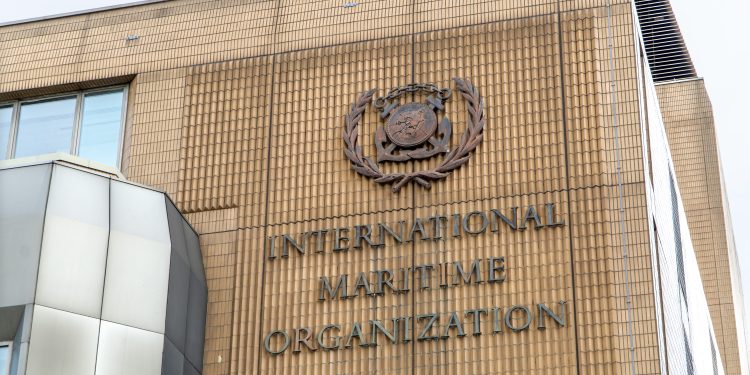The Intersessional Working Group (ISWG) on Greenhouse Gases (GHG) ISWG-GHG 12 took place from 16 to 22 May 2022, concluding that there was now consensus to price emissions at IMO, “as part of a basket of mid-term measures”.
According to UMAS, this is a major development which would put a price on shipping’s GHG emissions, and that has been on the table at IMO for more than a decade.
[smlsubform prepend=”GET THE SAFETY4SEA IN YOUR INBOX!” showname=false emailtxt=”” emailholder=”Enter your email address” showsubmit=true submittxt=”Submit” jsthanks=false thankyou=”Thank you for subscribing to our mailing list”]
Previous debates showed apparent disagreements between member states on these measures. Overall, good progress has been made in the first 12 months of IMO’s work on mid-term measures.
The IMO is on track for the schedule it agreed last year. And there is a lot of convergence about the objectives the final policy design will need to address
said UMAS.
There are a range of possible policy mechanisms (technical measures like mandates and economic/market-based measures) on the table which will now go through for further discussion, refinement and prioritisation.
Timescales for further policy development and implementation
The development of mid-term measures is scheduled in accordance with a workplan adopted at MEPC 76. This had three phases of development:
- Phase 1 – collation and initial consideration (spring 2021 – spring 2022)
- Phase 2 – assessment and selection of measures (spring 2022 – spring 2023)
- Phase 3 – development of measures(s) to be finalised with an agreed target date unassigned, as yet.
Whilst many member states are expressing the high urgency for the adoption of mid-term measures (MTM), the existing specifications for the timescales of phase 1 and 2 and processes of the IMO suggest that entry into force of MTM may be 2026 at the earliest. The key determinants of this are:
- How policies are now designed to address needs of a broad range of member states
- How smoothly the assessment of impact on States progresses
- How pressure and momentum is maintained both within, and outside, the IMO for urgent adoption of MTM
Availability of fuels and flexibility
The potential postponement to 2025 of entry into force for that policy was informed by a fuel availability study conducted in 2016/17. There will be further discussion of fuel availability studies at MEPC 78, and this is likely to remain a key element for further work as we move into phase 2 of the workplan.
There were three different approaches discussed in the session for addressing this concern, proposed by different member states:
- Proponents of GFS suggested incorporating a flexibility mechanism into the policy’s design – this could be a means to trade credits from overcompliance (e.g. achieving much greater reduction in emissions), or pay a price for non-compliance
- Some supported relaxing the Well-to-Wake (WTW) emissions framing for the initial phase of implementation of MTM, allowing access to a wider supply of fuels until supply chains for fuels that have minimal WTW emissions were established
- Some proposed that the solution to the concern lay in the design of the basket, with a GHG levy’s flexibility and revenue-use supporting deployment being the main driver during the initial phase of transition, and a fuel standard’s stringency and certainty being used in the second phase of transition
Impact on states
There are several different types of member state challenges expressed:
- SIDS and LDC’s vulnerability to climate change impacts and dependence on maritime for imports, and a need for generalised (not maritime specific) mitigation and adaptation finance
- Strong-exporter developing economies expressing concerns about general impact on trade/exports
- More remote developing economies expressing concerns about trade competitiveness
- Concerns about access to technology and investment for new fuels that enable shipping’s decarbonisation
- Concerns about impacts on ports and infrastructure and need for adaptation funding
An encouraging signal for the shape of the transition was that a majority of members states mentioned equitable transition in their intervention with the only main division between calling for equitability and questioning how the concept can be implemented in the policy design work
UMAS concluded.
Draft guidelines/guidance to support implementation of IMO’s carbon intensity reduction measures approved
The short-term measure to reduce carbon intensity was adopted as amendments to MARPOL Annex VI in June 2021 and includes the Energy Efficiency Existing Ship Index (EEXI); annual operational carbon intensity indicator (CII) rating and an enhanced Ship Energy Efficiency Management Plan (SEEMP). The new and updated guidelines will supplement (or replace) guidelines already adopted to support the implementation of the EEXI and CII regulations. These guidelines provide additional clarity to Administrations implementing the regulations and to the shipping industry.
Based on the outcome of a Correspondence Group on Carbon Intensity reduction attended by more than 300 experts in 2021 and 2022, the Working Group finalized the following guidelines/guidance, for adoption/approval by the Marine Environment Protection Committee (MEPC 78, 6 to 10 June 2022):
- 2022 Guidelines for the development of a Ship Energy Efficiency Management Plan (SEEMP)
- Guidelines for the verification and company audits by the Administration of Part III of the Ship Energy Efficiency Management Plan (SEEMP)
- 2022 Guidelines for Administration verification of ship fuel oil consumption data and operational carbon intensity
- 2022 Guidelines for the development and management of the IMO Ship Fuel Oil Consumption Database
- Guidance for the submission of data to the IMO data collection system from a State not Party to MARPOL Annex VI
- 2022 Guidelines on the method of calculation of the attained Energy Efficiency Existing Ship Index (EEXI)
- 2022 Guidelines on survey and certification of the attained Energy Efficiency Existing Ship Index (EEXI)
- Guidance on methods, procedures and verification of in-service performance measurements for EEXI calculation
- 2022 Interim Guidelines on Correction Factors and Voyage Adjustments for CII Calculations (CII Guidelines, G5)
- 2022 Guidelines on Operational Carbon Intensity Indicators and the Calculation Methods (CII Guidelines, G1)
- 2022 Guidelines on the Reference Lines for use with Operation Carbon Intensity Indicators (CII Reference Lines Guidelines, G2)
- 2022 Guidelines on the Operational Carbon Intensity Rating of Ships (CII Rating Guidelines, G4)
The Working Group also discussed draft amendments to the Procedures for port State control, 2021 (resolution A.1155(32)), related to enforcement of the short-term GHG reduction measure by Port State Control authorities. The Group agreed to refer the draft amendments prepared by the Correspondence Group to the Sub-Committee on Implementation of IMO Instruments (III 8, 25 to 29 July) for further consideration. In particular, the III Sub-Committee is requested to consider the issue of what is regarded as a detainable deficiency in relation to the CII rating and to advise MEPC 79 accordingly.
Proposals for mid- and long-term measures – moving to phase II of the Work plan on the development of mid-term measures
The Working Group considered in detail various proposals for mid-term measures and welcomed the proposals, their initial impact assessments, and other relevant documents (22 submissions to the Working Group as well as submissions referred from the MEPC).
The various proposals received support from several delegations, and the Group recognized that all these proposals contained valuable elements.
The Working Group supported, in general, the further development of a “basket of candidate mid-term measures”, integrating both various technical and carbon pricing elements while recognizing the necessary flexibility.
In accordance with Phase II of the Work plan, the Group agreed to continue its work by means of assessing, in particular, the (1) feasibility, (2) effectiveness to deliver the long-term levels of ambition and (3) potential impacts on States, of the “basket of candidate mid-term measures”.
The Group noted that there would be a need for additional information to support the development of the basket of candidate measures during Phase II. The Group also invited the proponents of the different candidate measures to work together intersessionnally with a view to exploring how different elements of these proposals could be combined within the “basket”, and invited Member States and international organizations to submit new documents to a future session, including refined proposals to that purpose.
































































The conclusions of this IMO working group may have been to identify that ‘a “basket of candidate mid-term measures”, integrating both various technical and carbon pricing elements while recognizing the necessary flexibility;’ could be further developed.
However, the Secretariat’s useful document ISWG-GHG 12/INF.2 (paragraph 19) identifies that: “MEPC 59 considered a large number of views and contributions on the subject, and agreed by overwhelming majority that a MBM was needed as part of a comprehensive package of measures for the regulation of GHG emissions from international shipping.” And “The Committee agreed that any regulatory scheme on GHG emissions applied to international shipping should be developed and enacted by the Organization as the most competent relevant international body.”
I am not sure how the conclusion reached by ISWG-GHG 12 is any different to the view of the Committee in July 2009? That was a consensus then on developing a measure enacted by the IMO but as we know it was not a consensus on implementation.
It is a shame that the industry proposal to support R&D now appears to have got lost in the debate about MBMs but you never know some more Member States may begin to realise that it is an opportunity to implement a ‘levy’ now, albeit at a very low level, rather than later this decade, if at all!